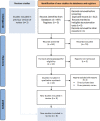Banded versus non-banded sleeve gastrectomy: A systematic review and meta-analysis
- PMID: 37058050
- PMCID: PMC10101294
- DOI: 10.1097/MD.0000000000032982
Banded versus non-banded sleeve gastrectomy: A systematic review and meta-analysis
Abstract
Background: Laparoscopic banded sleeve gastrectomy (LBSG) has been compared to laparoscopic sleeve gastrectomy (LSG) in terms of anthropometric results and postoperative complications, which are controversial. This systematic review and meta-analysis aimed to compare the safety and efficacy of LBSG and LSG.
Methods: We performed a systematic review with meta-analysis according to preferred reporting items for systematic review and meta-analysis 2020 and assessing the methodological quality of systematic review 2 guidelines. We included studies that systematically searched electronic databases and compared LBSG with LSG conducted until August 10, 2021.
Results: The literature search yielded 8 comparative studies. Seven hundred forty-three patients were included: 352 in the LBSG group and 391 in the LSG group. LBSG group allowed greater anthropometric parameters (body mass index [BMI] after 1 year (mean difference [MD] = -3.18; 95% CI [-5.45, -0.92], P = .006), %EWL after 1 year (MD = 8.02; 95% CI [1.22, 14.81], P = .02), and %EWL after 3 years (MD = 10.60; 95% CI [5.60, 15.69], P < .001) and similar results with LSG group in terms of operative time (MD = 1.23; 95% CI [-4.71, 7.17], P = .69), food intolerance (OR = 1.72; 95% CI [0.84, 3.49], P = .14), postoperative vomiting (OR = 2.10; 95% CI [0.69, 6.35], P = .19), and De novo GERD (OR = 0.65; 95% CI [0.34, 1.26], P = .2). Nevertheless, major postoperative complications did not differ between the 2 groups.
Conclusions: This systematic review and meta-analysis comparing LBSG and LSG concluded that banding sleeve gastrectomy (SG) may ensure a lower BMI and %EWL after 1 year of follow-up, and a significant reduction in %EWL after 3 years of follow-up. There is no evidence to support LBSG in vomiting, de novo GERD, food intolerance, or operative time.
Copyright © 2023 the Author(s). Published by Wolters Kluwer Health, Inc.
Conflict of interest statement
The authors have no funding and conflicts of interest to disclose.
Figures




References
-
- Welbourn R, Pournaras DJ, Dixon J, et al. . Bariatric surgery worldwide: baseline demographic description and one-year outcomes from the second IFSO global registry report 2013-2015. Obes Surg. 2018;28:313–22. - PubMed
-
- Felsenreich DM, Langer FB, Kefurt R, et al. . Weight loss, weight regain, and conversions to Roux-en-Y gastric bypass: 10-year results of laparoscopic sleeve gastrectomy. Surg Obes Relat Dis. 2016;12:1655–62. - PubMed
-
- Felsenreich DM, Langer FB, Prager G. Weight loss and resolution of comorbidities after sleeve gastrectomy: a review of long-term results. Scand J Surg. 2019;108:3–9. - PubMed
-
- Lauti M, Kularatna M, Hill AG, et al. . Weight regain following sleeve gastrectomy—a systematic review. Obes Surg. 2016;26:1326–34. - PubMed
-
- Pourcher G, Chaouch MA, Peyrottes A, et al. . Single-port one anastomosis duodenal switch revision of a sleeve gastrectomy: first description. Obes Surg. 2022;1:3205. - PubMed
Publication types
MeSH terms
LinkOut - more resources
Full Text Sources
Medical

